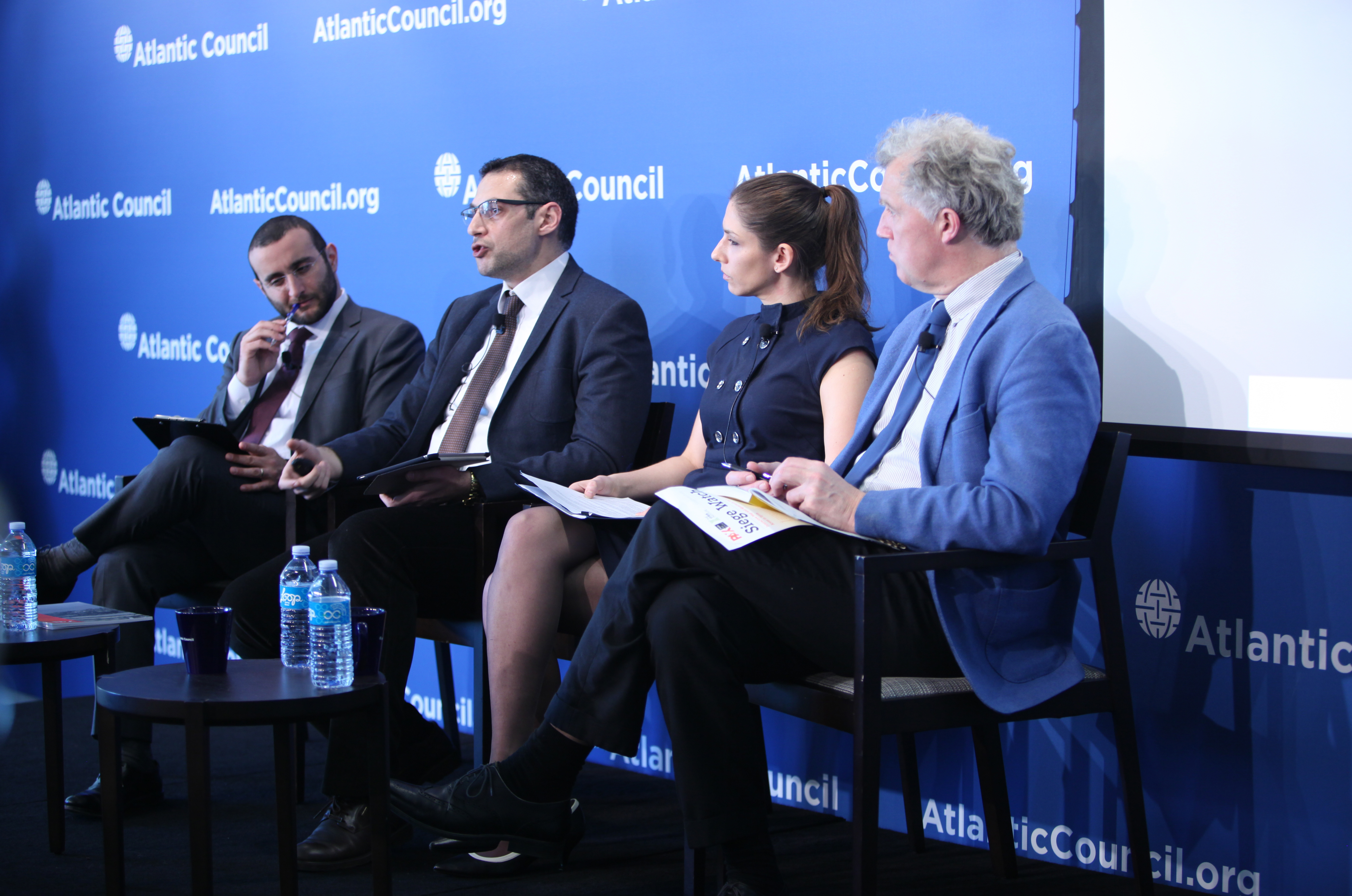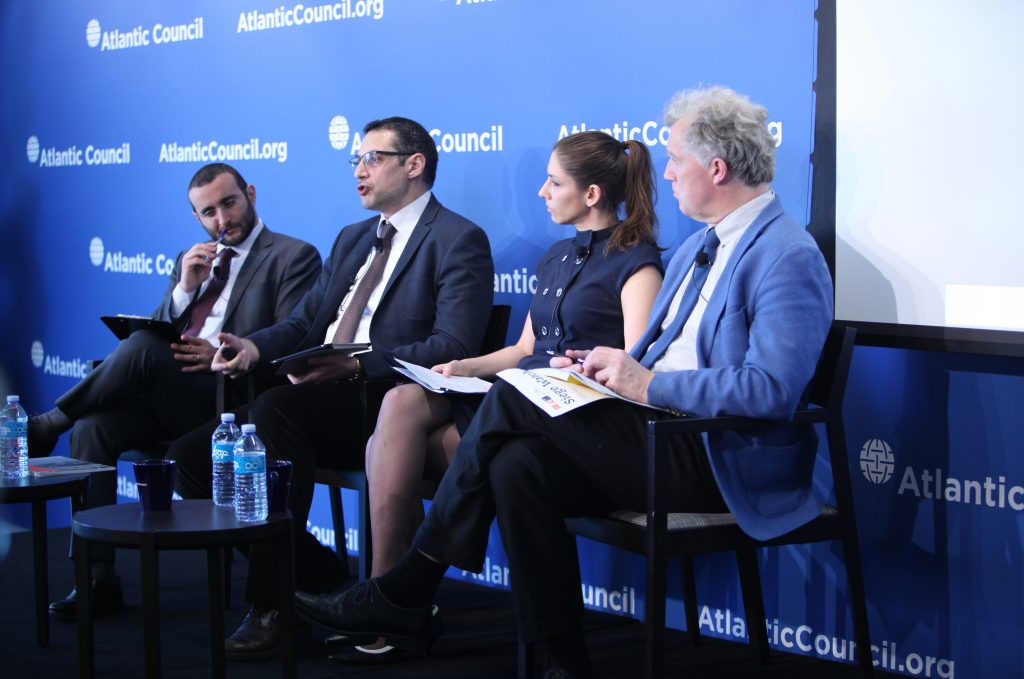 The Obama administration will have to confront Russia and Iran—supporters of embattled Syrian President Bashar al-Assad—if it wants to win the war against the Islamic State of Iraq and al-Sham (ISIS), Frederic C. Hof, a Resident Senior Fellow in the Atlantic Council’s Rafik Hariri Center, said September 16.
The Obama administration will have to confront Russia and Iran—supporters of embattled Syrian President Bashar al-Assad—if it wants to win the war against the Islamic State of Iraq and al-Sham (ISIS), Frederic C. Hof, a Resident Senior Fellow in the Atlantic Council’s Rafik Hariri Center, said September 16.
Russia’s recently ramped up military presence in Syria has complicated the crisis and the Obama administration must now lean heavily on Moscow and Tehran to “get their client out of this filthy business,” Hof said at an Atlantic Council panel discussion.
Hof, who served in the Obama administration as a Special Adviser for transition in Syria, said the White House faces a stark choice in Syria: “Continue to accede to the wanton slaughter of civilians in Syria as the country empties itself of all inhabitants with the means and the motivation to leave, or complicate the ability of Bashar al-Assad to kill on an industrial scale?”
The administration now seems to grasp the futility of acceding and is “considering measures designed to keep Assad from doing his worst,” he added.
US Secretary of State John Kerry said September 16 that Russia has proposed military level talks with the United States on developments in Syria. The Russian offer came a day after Kerry told his Russian counterpart, Sergei Lavrov, that Moscow’s support for Assad “risks exacerbating and extending the conflict” in Syria.
US officials say Russia is trying to set up a forward operating base at the Syrian Mediterranean port city of Latakia, an Assad stronghold.
“Condors are landing on a daily basis now,” Rep. Ed Royce (R-CA), Chairman of the House Foreign Affairs Committee, said at the Atlantic Council, referring to Russian military transport planes in Syria.
“Tanks and armored personnel carriers and other pieces of equipment are being moved on besides the aircraft that they are bringing in,” he added.
Royce said Iranian-backed Hezbollah has also exploited the chaos by coming to Assad’s defense.
While the United States and its P5+1 partners—the United Kingdom, Russia, China, France, and Germany—have recently negotiated a nuclear deal with Iran, the Obama administration says those discussions have not extended to developments in Syria.
Assad’s barrel bombs
The Assad regime continues to wage a war on civilians using barrel bombs and, in some cases, suspected chemical weapons.
“The strategic purpose of this weaponry is to prevent alternative non-ISIL governance to arise in areas not under the control of the Assad regime,” said Hof. ISIS is also known as the Islamic State of Iraq and the Levant (ISIL).
“Mass casualties and mass terror are the explicit desired effects,” he added.
The Syrian war, now in its fifth year, has claimed the lives of almost a quarter million people, displaced more than seven million within Syria, and has created four million refugees some of whom are now streaming into Europe.
United Nations Secretary-General Ban Ki-moon, referring to the migrant crisis facing Europe, said September 16 that Syrians facing “barrel bombs and brutality in their country will continue to seek life in another.”
Royce described what’s happening in Syria as “ethnic cleansing” of Sunnis by Assad’s Alawite regime.
Hof said he had given up on the possibility of US President Barack Obama being motivated by “some sense of humanitarian imperative to intervene” in Syria “to do what I describe as throwing sand into the gears of this murder machine.”
But, he added, there is a strong argument to be made for civilian protection as a “strategic war-fighting necessity.”
The Obama administration is part of a coalition of more than sixty countries that are fighting ISIS in Syria and Iraq. It has committed to degrading and ultimately destroying ISIS.
Hof described the Assad regime as the “greatest enabler” of ISIS, and “collective punishment and mass murder” as the main tool being used to enable ISIS.
“My bottom line is this: Mass slaughter renders irrelevant all talk of a negotiated settlement, all talk about political transition arrangements,” Hof said. “Civilian protection is the sole portal through which positive things in Syria—political negotiations and the defeat of ISIL—are possible.”
“The United States and its partners have the means far, far, far short of invasion, occupation, and strategic bombing to stop this regime from doing its worst. … Protecting civilians, whether as a humanitarian duty or a war-fighting necessity, in my view is the essential next step for the Western approach and policy towards Syria,” he added.
‘Food baskets don’t stop barrel bombs’
What is happening in Syria is not primarily a humanitarian catastrophe, but “a political and military crisis that is causing this humanitarian catastrophe,” said Rola Hallam, Medical Director of the charity Hand in Hand for Syria.
Hallam has been involved in setting up hospitals in northern Syria since the war broke out in 2011. Attacks on medical facilities have deprived Syrians of access to health care. Two years ago, the European Commission reported that 200,000 civilians had died because of a lack of access to health care in Syria.
Noting that the international community’s response to the war has primarily been one of providing aid to Syrians, Hallam said: “Food baskets and stethoscopes don’t stop barrel bombs falling from helicopters onto our friends and family.”
The Assad regime has also used prolonged sieges of population centers—primarily blocking food, water, and medical supplies, and the movement of people—to mete out collective punishment, said Valerie Szybala, Executive Director of the Syria Institute.
A report by the Syrian American Medical Society on the besieged areas found more than 640,000 of Syrians are living under siege. Another finding of the report was that the United Nations Office for the Coordination of Humanitarian Affairs (UNOCHA) is significantly underreporting the numbers and “manipulating the data for political reasons,” Szybala said.
Access in conflict areas has been a major challenge for international aid organizations. The problem is that foreign governments funnel aid through these international NGOs, said Hallam.
“You have this discrepancy right now between those who have the funding, but they don’t have the access,” she said. “We have the access, but we don’t have the funding.”
Ashish Kumar Sen is a staff writer at the Atlantic Council.
Image: From left: Frederic C. Hof, a Resident Senior Fellow in the Atlantic Council’s Rafik Hariri Center; Rola Hallam, Medical Director of the charity Hand in Hand for Syria; and Valerie Szybala, Executive Director of the Syria Institute participate in a September 16 panel discussion at the Atlantic Council on policy options in Syria.
